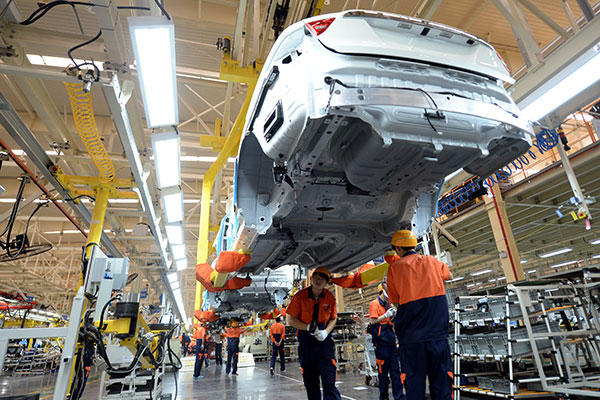

 |
| The production line of Geely Holding Group in Hangzhou, capital of Zhejiang province. [Photo/Xinhua] |
Geely Holding Group, which owns Volvo Car Corp, plans to expand its methanol vehicle operation after its decision to invest $45.5 million in Iceland's Carbon Recycling International Inc.
The company operates the world's first methanol plant in Iceland.
Geely's deal consists of an initial payment with additional purchases of CRI equity over a three-year period. The Chinese car manufacturer will then become a major CRI shareholder and join the company's board of directors, according to a CRI statement.
Li Shufu, chairman of Zhejiang-based Geely, said the investment will build on its existing methanol technology. This will help speed up the development of methanol-powered vehicles in China, the statement revealed.
"It will also allow us to promote advanced methanol technology in Europe, since the company is strong in renewable methanol," Li said. "This is an important symbol of our global commitment to sustainability."
Founded in 2006, CRI produces renewable methanol fuel from recycled carbon dioxide emissions and clean energy.
It also focuses on electricity for energy storage, fuel applications and efficiency enhancement.
Methanol is clean burning with the lowest carbon content and highest hydrogen content for any liquid fuel. It can be blended with petroleum for automobiles and used in the production of biodiesel. This in turn reduces carbon emissions by more than 90 percent compared to fossil fuels.
Usually produced from wood, methanol is now widely used in racing cars in the United States. It can also be made from coal.
Geely's efforts to promote methanol-fueled cars started in 2005.
The company has already deployed pilot fleets of methanol-fueled taxis in Shanxi and Shaanxi provinces, and Shanghai.
China is edging ahead with alternative energy to reduce its reliance on fossil-fuels as well as to fight air pollution.
The country has set a target of producing and selling 500,000 energy-efficient vehicles a year by 2015, and five million vehicles a year by 2020.
But experts said that whether methanol will become a feasible alternative to petroleum-based fuels still remains unclear due to technological problems and a lack of charging stations.
Ma Jing, chief engineer of the Shanghai Economic and Information Technology Commission, said that the performance of methanol-powered vehicles is not as good as traditional petroleum-based ones.
"Methanol-fueled vehicles don't have an obvious advantage over traditional ones," Ma said in Beijing.
 Evolution of Chinese beauties in a century
Evolution of Chinese beauties in a century Creative graduation caps of ‘vigorous elves’
Creative graduation caps of ‘vigorous elves’ Typhoon class strategic Submarine in photos
Typhoon class strategic Submarine in photos Hong Kong college students feel the charm of Hanfu
Hong Kong college students feel the charm of Hanfu Japan’s crimes committed against "comfort women"
Japan’s crimes committed against "comfort women" Odd news:“carrying a rod and asking to be spanked”
Odd news:“carrying a rod and asking to be spanked” Legendary life of a bee-keeping master in Hainan
Legendary life of a bee-keeping master in Hainan 4-year-old cute 'monk' spends summer holiday in temple
4-year-old cute 'monk' spends summer holiday in temple Hong Kong in lens
Hong Kong in lens Editorial: An uncertain road ahead for Greece and EU
Editorial: An uncertain road ahead for Greece and EU China’s class of 2015 gets creative with graduation photos
China’s class of 2015 gets creative with graduation photos Girl power on the pitch
Girl power on the pitch Giant panda Yuanzai turns two at Taipei Zoo
Giant panda Yuanzai turns two at Taipei ZooDay|Week